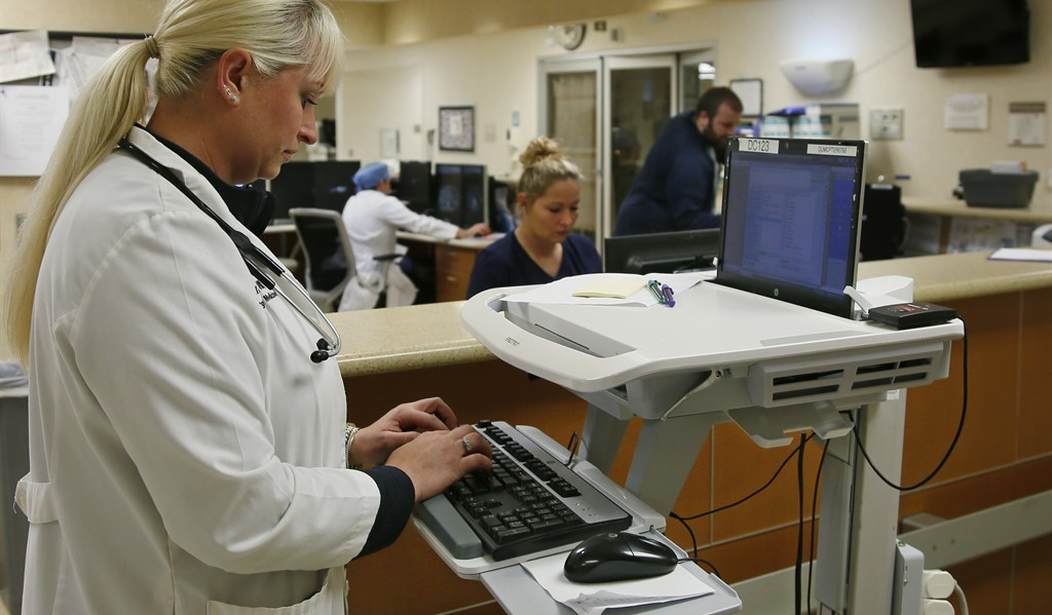Every politician running for president has a plan for our health care system. Unfortunately for us, they’re all varying degrees of government control that will lead to rationing care to keep costs down. However, as I’ve written about multiple times, while there’s no silver bullet for making everything work better, there are tweaks that can be made to improve the system, increase access, and keep costs under control. It’s just a matter of having the will and the good sense to do them, and in Washington, nothing is as rare as good sense.
You’d think everyone involved in the health care system would have one objective – making everything work better for as many people as possible. That’s not always the case. When there are trillions of dollars on the table, some will move to grab as big of a slice of that pie as they possibly can.
That’s why every interest group even tangentially involved in the health care industry has lobbyists, societies, and organizations designed to protect their slice of the pie while fighting for pieces of others. It’s not a bad thing, per se, and not unique to health care. It’s just that there is no other pie quite as big, so even crumbs represent more than the GDP of many countries.
Each little piece may seem small but, like with an engine, if one part isn’t working it has repercussions for the whole thing.
There’s a distinct populist, anti-large company strain running through both political parties right now. The idea to regulate or break up large tech and pharmaceutical companies and banks is strong on both sides of the aisle. So the idea of consolidation in health care seems like it would be met like an unwanted houseguest. But sometimes mergers are the only option to ensure people maintain access to care and facilities stay open.
Rural hospitals, for example, have a difficult time keeping their doors open. It takes a lot of people to maintain a hospital, both from a staff and patient perspective. You may not like to think of it this way, but patients are customers and without enough customers businesses have difficulty staying open. And since most of the country is not a major urban area, rural medical facilities are the lifeblood of millions of Americans. And many are struggling.
Recommended
In the face of this economic reality, one that would put taxpayers on the hook if the government simply seized control, decisions have to be made to keep the lights on. The most obvious and successful option is to merge with bigger facilities with large budgets. It makes perfect sense, but making perfect sense doesn’t always mean everyone is happy, especially when so much money is at stake.
I bring this up because a friend who works on behalf of these institutions brought something to my attention – that there are groups that ostensibly exist to protect patients and doctors that are actively working against this lifeline.
I get it, bigger is seen as bad right now. But when the choice is between bigger or nothing, bigger is always better when it comes to access to care.
That’s why it’s curious that a group that’s supposed to represent the interests of physicians is so opposed to mergers to keep rural facilities open. Physicians work in those facilities, after all.
But the Physicians Advocacy Institute does just that. Makes you wonder why. Then you realize, as my friend pointed out to me, that many members of PAI’s board hold positions that are dependent upon money from the health insurance industry – running state medical societies that are funded by big insurance companies. And health insurance companies don’t like mergers, it gives facilities more leverage in negotiations with them on costs. Hand-in-glove, everyone is fighting to protect their slice of the pie.
Needless to say, the whole thing is a mess. Again, lost in this is the interest of the patients. And the most pressing interest of the patients is access to care. Driving hours for a routine check-up versus driving to a small rural hospital can be the difference between life and death. If mergers are what it takes to keep these lifelines open, so be it.
Yet, because so much money is involved, something that makes perfect, common sense can be opposed by a non-profit physicians group under the guise of competition.
Everyone knows which buzzwords to use, but lost in this scramble is what’s best for patients. This leaves a void that can easily be filled with empty promises from politicians of a utopian system where the government makes sure everything runs smoothly and everyone gets everything they need. That’s a false promise; a lie. But it’s a lie advanced by relationships and self-interest behind the scenes that most people will never see or know about. This isn’t the only instance, there are more than you can possibly imagine. And in the end, if these players don’t put down their forks and become content with what they have, we’re all going to end up with nothing but those empty promises.
Derek is the host of a free daily podcast (subscribe!) and author of the book, Outrage, INC., which exposes how liberals use fear and hatred to manipulate the masses.
























Join the conversation as a VIP Member